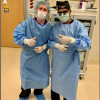We use evidence-based approaches to study and improve surgery for our patients. Once surgeons and scientists have a molecular target in their sights, numerous molecular drugs are available to them. These may involve enzymes, genes, antibodies, or chemicals. Eye surgeons can precisely and safely deliver any of these molecules near specific cells in the eye, avoiding the toxicity and issues associated with drugs taken by mouth or injected into the blood stream. Once delivered, patients can be observed noninvasively in the clinic using ultra-high-resolution cameras.
Projects
 Consortium for Liquid Biopsies
Consortium for Liquid Biopsies
A multi-institution precision health consortium for collecting ophthalmic surgical samples.
Macular Hole Surgery
We conducted laboratory and clinical studies on macular hole repair.
Optimizing Surgical Wounds
We conduct studies to develop safer, more efficient surgery in patients.
 Vitreoretinal Surgery
Vitreoretinal Surgery
Evidence-based approaches for new surgical treatments and research to discover the molecular causes.
News
 Mahajan Gives Keynote at RIMR Conference
Mahajan Gives Keynote at RIMR Conference
Irvine CA — At the 15th annual Ryan Initiative for Macular Research (RIMR) Conference, the Gerald Lutty Memorial Lecture was given by keynote speaker Vinit Mahajan M.D., Ph.D., Stanford professor and vice chair of ophthalmology research.
 NIH Features Proteomic Eye Clock
NIH Features Proteomic Eye Clock
Palo Alto, CA — Research from the Mahajan lab was featured in NIH's newsite, NIH Research Matters.
 TEMPO Uncovers Protein Origins in Living Eyes
TEMPO Uncovers Protein Origins in Living Eyes
Palo Alto, CA — The eyes may be a window into the soul, but Stanford research scientists are now showing the eyes may also be a window into overall human health.


